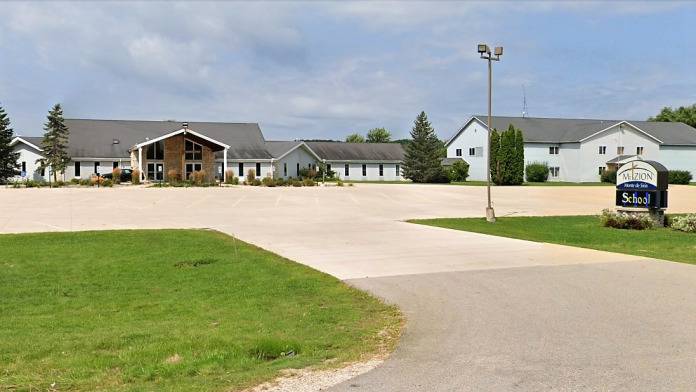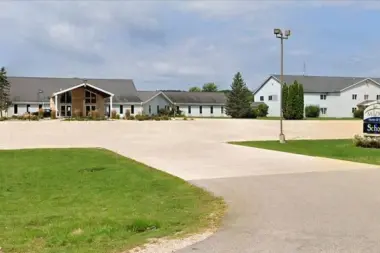About Mt Zion House
There’s a Christian alcohol and drug residential recovery program called Mt Zion House in Lake Geneva, Wisconsin. The program is grounded in spiritual practices and biblical teachings. They’re guided by the belief that complete recovery is achievable through the restorative power of Jesus Christ and the word of God. Mt. Zion House as part of Mt. Zion Christian Church.
This 24 bed facility is situated on a 15 acre parcel of land just outside the downtown area of Lake Geneva. The facility sits along Highway 120 which provides direct access to nearby cities of Elkhorn, Burlington and Kenosha. The Geneva Lake is just three miles away from the clinic. The Big Foot Beach State Park and Lake Como are also nearby. This natural scenery offers a peaceful space for prayers, reflection and bible studies. They also offer great outdoor recreational opportunities including boating, hiking trails and fishing.
For indoor recreation, there is a workout area at the house and a gymnasium available at Mt. Zion Christian Church nearby. The facility has a big kitchen, dorm style bedrooms and a common room as well as a chapel, classrooms and offices. Residents enjoy tasty and balanced meals to support recovery. However, if you feel like trying something different from the house menu, there are great restaurants within three miles of the facility. These include Sopra Bistro, Oakfire and Egg Harbor Café.
Phased Christ Focused Addiction Recovery
Mt Zion House residential recovery involves a three phase Christ centered program that lasts at least 26 weeks. Phase one begins immediately upon entry and lasts four weeks. It primarily involves an in house residential schedule. You’ll attend classes, group discussions and individual discipleship meetings to deepen your faith and strengthen your path to recovery.
Through group discussions and church attendance, you’ll build a sense of community and reinforce your spiritual foundation for healing. Work therapy is emphasized and you’re required to take on responsibilities that help build discipline and practical skills for daily life. This may include completing your daily chores, helping in the kitchen, general facility maintenance and gardening. You’ll also enjoy recreational time to just have fun and relax in recovery.
Working Toward Independence in Lake Geneva
The second phase comprises an eight week transitional period that guides you towards independence
and self-sufficiency. You’re required to secure a full time, first shift job which is key to building a stable foundation for life outside the program. During this phase, you’ll start taking responsibility for your living expenses like housing, food and any other costs. Emphasis is placed on building the skills and habits necessary to stand on your own two feet.
As you demonstrate faithfulness and obedience to the Christian principles of the program, you’ll advance to the final phase. This phase lasts 14 weeks and grants you an opportunity for more privileges onsite. This may include increased personal time and opportunities to reconnect with family. The goal is to help you transition into greater independence while maintaining accountability.
Latest Reviews
Rehab Score
Gallery


Other Forms of Payment
Self-pay involves paying for treatment out of your own pocket. You can use savings or credit, get a personal loan, or receive help from family and friends to fund your treatment. If you don't have insurance or your insurance plan doesn't cover a specific program, self-pay can help ensure you still get the care you need.
Addiction Treatments
Levels of Care
Residential treatment programs are those that offer housing and meals in addition to substance abuse treatment. Rehab facilities that offer residential treatment allow patients to focus solely on recovery, in an environment totally separate from their lives. Some rehab centers specialize in short-term residential treatment (a few days to a week or two), while others solely provide treatment on a long-term basis (several weeks to months). Some offer both, and tailor treatment to the patient's individual requirements.
Treatments
The goal of treatment for alcoholism is abstinence. Those with poor social support, poor motivation, or psychiatric disorders tend to relapse within a few years of treatment. For these people, success is measured by longer periods of abstinence, reduced use of alcohol, better health, and improved social functioning. Recovery and Maintenance are usually based on 12 step programs and AA meetings.
The goal of drug rehab in Wisconsin is to address drug addiction as a complex issue that involves physical, mental, and relational aspects. During rehab, treatment focuses on each of these areas and gives you the tools you need to achieve and maintain sobriety.
Opioid rehabs specialize in supporting those recovering from opioid addiction. They treat those suffering from addiction to illegal opioids like heroin, as well as prescription drugs like oxycodone. These centers typically combine both physical as well as mental and emotional support to help stop addiction. Physical support often includes medical detox and subsequent medical support (including medication), and mental support includes in-depth therapy to address the underlying causes of addiction.
Substance rehabs focus on helping individuals recover from substance abuse, including alcohol and drug addiction (both illegal and prescription drugs). They often include the opportunity to engage in both individual as well as group therapy.
Programs
Adult rehab programs include therapies tailored to each client's specific needs, goals, and recovery progress. They are tailored to the specific challenges adult clients may face, including family and work pressures and commitments. From inpatient and residential treatment to various levels of outpatient services, there are many options available. Some facilities also help adults work through co-occurring conditions, like anxiety, that can accompany addiction.
Young adulthood can be an exciting, yet difficult, time of transition. Individuals in their late teens to mid-20s face unique stressors related to school, jobs, families, and social circles, which can lead to a rise in substance use. Rehab centers with dedicated young adult programs will include activities and amenities that cater to this age group, with an emphasis on specialized counseling, peer socialization, and ongoing aftercare.
Clinical Services
Group therapy is any therapeutic work that happens in a group (not one-on-one). There are a number of different group therapy modalities, including support groups, experiential therapy, psycho-education, and more. Group therapy involves treatment as well as processing interaction between group members.
In individual therapy, a patient meets one-on-one with a trained psychologist or counselor. Therapy is a pivotal part of effective substance abuse treatment, as it often covers root causes of addiction, including challenges faced by the patient in their social, family, and work/school life.
Life skills trainings involve all the skills a person must have in order to function successfully in the world. These include time management, career guidance, money management, and effective communication. Truly successful addiction recovery is based on the ability to not only live substance-free, but to thrive. Life skills teaches the practical necessities of functioning in society, which sets clients up for success in life, and therefore sobriety.
Recreational therapy (aka therapeutic recreation) uses creative and fun activities to help with addiction recovery. Recreational therapists lead patients in entertaining and engaging activities like sports or games; art (drawing, painting, sculpture); drama, music, and dance; and/or community outings (field trips) to improve patients' physical, social, and emotional well-being.
Amenities
-
Private Setting
-
Lakeside
-
Hiking
-
Gym
Staff
Pastor Bo Boilek
Director
Contact Information
2330 Highway 120
Lake Geneva, WI 53147